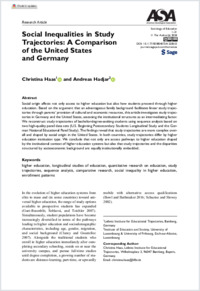Social Inequalities in Study Trajectories: A Comparison of the United States and Germany
BP2-STS
- Haas, Christina ORCID Leibniz Institute for Educational Trajectories, Bamberg, Germany
- Hadjar, Andreas ORCID Institute of Education and Society, University of Luxembourg & University of Fribourg, Esch-sur-Alzette, Luxembourg
- 2024
Published in:
- Sociology of Education. - SAGE Publications. - 2024
English
Social origin affects not only access to higher education but also how students proceed through higher education. Based on the argument that an advantageous family background facilitates linear study trajectories through parents’ provision of cultural and economic resources, this article investigates study trajectories in Germany and the United States, assessing the institutional structures as an inter-mediating factor. We reconstruct study trajectories of bachelor-degree-seeking students using sequence analysis based on two high-quality panel data sets (U.S. Beginning Post-secondary Students Longitudinal Study and the German National Educational Panel Study). The findings reveal that study trajectories are more complex overall and shaped by social origin in the United States. In both countries, study trajectories differ by higher education institution type. We conclude that not only are access pathways to higher education shaped by the institutional context of higher education systems but also that study trajectories and the disparities structured by socioeconomic background are equally institutionally embedded.
- Faculty
- Faculté des lettres et des sciences humaines
- Department
- Département de travail social, politiques sociales et développement global
- Language
-
- English
- License
- CC BY
- Open access status
- hybrid
- Identifiers
-
- DOI 10.1177/00380407241228553
- ISSN 0038-0407
- Persistent URL
- https://folia.unifr.ch/unifr/documents/328371
Statistics
Document views: 30
File downloads:
- haas-hadjar-2024-social-inequalities-in-study-trajectories-a-comparison-of-the-united-states-and-germany.pdf: 140
